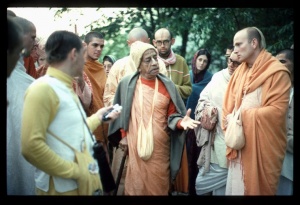CC Madhya 9.117 (1975): Difference between revisions
(Vanibot #0027: CCMirror - Mirror CC's 1996 edition to form a basis for 1975) |
(Vanibot #0020: VersionCompareLinker - added a link to the Version Compare feature) |
||
| Line 2: | Line 2: | ||
<div style="float:left">'''[[Sri Caitanya-caritamrta (1975)|Śrī Caitanya-caritāmṛta (1975)]] - [[CC Madhya (1975)|Madhya-līlā]] - [[CC Madhya 9 (1975)|Chapter 9: Lord Śrī Caitanya Mahāprabhu's Travels to the Holy Places]]'''</div> | <div style="float:left">'''[[Sri Caitanya-caritamrta (1975)|Śrī Caitanya-caritāmṛta (1975)]] - [[CC Madhya (1975)|Madhya-līlā]] - [[CC Madhya 9 (1975)|Chapter 9: Lord Śrī Caitanya Mahāprabhu's Travels to the Holy Places]]'''</div> | ||
<div style="float:right">[[File:Go-previous.png|link=CC Madhya 9.116 (1975)|Madhya-līlā 9.116]] '''[[CC Madhya 9.116 (1975)|Madhya-līlā 9.116]] - [[CC Madhya 9.118 (1975)|Madhya-līlā 9.118]]''' [[File:Go-next.png|link=CC Madhya 9.118 (1975)|Madhya-līlā 9.118]]</div> | <div style="float:right">[[File:Go-previous.png|link=CC Madhya 9.116 (1975)|Madhya-līlā 9.116]] '''[[CC Madhya 9.116 (1975)|Madhya-līlā 9.116]] - [[CC Madhya 9.118 (1975)|Madhya-līlā 9.118]]''' [[File:Go-next.png|link=CC Madhya 9.118 (1975)|Madhya-līlā 9.118]]</div> | ||
{{CompareVersions|CC|Madhya 9.117|CC 1975|CC 1996}} | |||
{{RandomImage}} | {{RandomImage}} | ||
==== TEXT 117 ==== | ==== TEXT 117 ==== | ||
<div class="verse"> | <div class="verse"> | ||
:siddhāntatas tv abhede | :siddhāntatas tv abhede 'pi | ||
:śrīśa-kṛṣṇa-svarūpayoḥ | :śrīśa-kṛṣṇa-svarūpayoḥ | ||
:rasenotkṛṣyate kṛṣṇa- | :rasenotkṛṣyate kṛṣṇa- | ||
| Line 27: | Line 26: | ||
<div class="translation"> | <div class="translation"> | ||
Veṅkaṭa Bhaṭṭa continued, | Veṅkaṭa Bhaṭṭa continued, " 'According to transcendental realization, there is no difference between the forms of Nārāyaṇa and Kṛṣṇa. Yet in Kṛṣṇa there is a special transcendental attraction due to the conjugal mellow, and consequently He surpasses Nārāyaṇa. This is the conclusion of transcendental mellows.' | ||
</div> | </div> | ||
| Line 34: | Line 33: | ||
<div class="purport"> | <div class="purport"> | ||
This verse quoted by Veṅkaṭa Bhaṭṭa is also found in | This verse quoted by Veṅkaṭa Bhaṭṭa is also found in Bhakti-rasāmṛta-sindhu (1.2.59). | ||
</div> | </div> | ||
Latest revision as of 20:32, 27 January 2020

A.C. Bhaktivedanta Swami Prabhupada
TEXT 117
- siddhāntatas tv abhede 'pi
- śrīśa-kṛṣṇa-svarūpayoḥ
- rasenotkṛṣyate kṛṣṇa-
- rūpam eṣā rasa-sthitiḥ
SYNONYMS
siddhāntataḥ—in reality; tu—but; abhede—no difference; api—although; śrī-īśa—of the husband of Lakṣmī, Nārāyaṇa; kṛṣṇa—of Lord Kṛṣṇa; svarūpayoḥ—between the forms; rasena—by transcendental mellows; utkṛṣyate—is superior; kṛṣṇa-rūpam—the form of Lord Kṛṣṇa; eṣā—this; rasa-sthitiḥ—reservoir of pleasure.
TRANSLATION
Veṅkaṭa Bhaṭṭa continued, " 'According to transcendental realization, there is no difference between the forms of Nārāyaṇa and Kṛṣṇa. Yet in Kṛṣṇa there is a special transcendental attraction due to the conjugal mellow, and consequently He surpasses Nārāyaṇa. This is the conclusion of transcendental mellows.'
PURPORT
This verse quoted by Veṅkaṭa Bhaṭṭa is also found in Bhakti-rasāmṛta-sindhu (1.2.59).